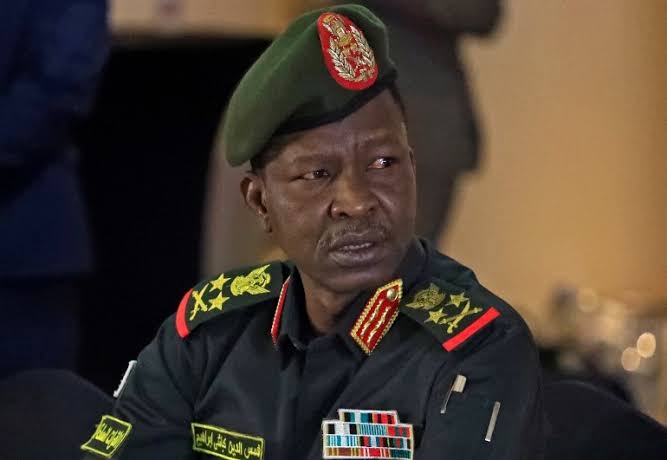Sudan is mired in chaos, and anyone looking in can see that. Power struggles and hidden agendas frequently overshadow promises of stability and peace; alliances grow based on common needs at the time and fall as soon as ample opportunity arises. It is no surprise that Lieutenant General Shams al-Din Kabbashi, who had emerged as a pivotal figure amidst claims of moderation and reform, now exposes actions that suggest a far more complex and troubling agenda.
Unveiling the Facade
Kabbashi’s ascent began in the wake of Sudan’s 2019 revolution, which saw the ousting of longtime ruler Omar al-Bashir. During the following military transition, Kabbashi assumed a prominent public role, initially seen as a beacon of hope for democracy and civilian rule. However, the transition has faltered under the military’s grip, with Kabbashi playing a key role in shaping the country’s trajectory. He has portrayed himself as a centrist leader advocating for peace and international cooperation. However, beneath this carefully crafted image lies a stark reality: Kabbashi’s true intentions seem aimed at undermining moderate forces and steering Sudan towards a hardline Islamic regime.
Economic and Regional Significance
Sudan is not merely a distant nation embroiled in a brutal civil war; it holds significant strategic and economic importance for Africa, the Middle East, Europe, and even the United States. The country’s vast reserves of gold, uranium, iron, and other resources like sesame seeds and gum Arabic (used in countless everyday products) make it a critical player in global commerce. The ongoing civil war disrupts this commerce, but beyond these economic factors, Sudan’s strategic location adds another layer of complexity.
The Red Sea, a critical maritime route, is a battleground for influence, with Russia and Iran vying for control of a key military base. The United States and its allies have an interest in securing this base to counterbalance these adversaries’ ambitions. Control of this strategic point could determine the dominance of ideologies, trade routes, and, more alarmingly, the support of terrorist activities, thereby perpetuating regional instability.
The Illusion of Diplomacy
Kabbashi has consistently engaged in diplomatic maneuvers to gain international support and legitimacy. His interactions with global powers such as Israel, the United States, UAE, and the European Union have been characterized by promises of peace and cooperation, ostensibly aimed at stabilizing Sudan’s fragile political landscape. However, these gestures often mask a deeper agenda rooted in consolidating power and advancing Islamist interests.
Kabbashi’s duplicity is perhaps best exemplified by his contradictory actions on the international stage. While he pledges to halt Sudan’s internal conflicts and offers economic incentives—such as promising gold to the UAE to garner financial support and geopolitical favor—he simultaneously seeks Turkish intelligence backing, potentially for a coup, betraying his purported commitment to democratic governance and civilian rule.
Ideological Alliances
Kabbashi’s affiliation with the Sudanese Islamic Movement, a group with ties to Islamist ideologies, further reveals his underlying agenda to reshape Sudan’s political landscape in favor of conservative Islamic principles. His promise to annul Sudan’s participation in the Abraham Accords—a significant diplomatic achievement aimed at normalizing relations with Israel—underscores his willingness to discard international agreements for ideological gains.
Military and Intelligence Intrigue
Kabbashi’s agenda is complemented by his connections with Sudan’s military and intelligence apparatus. General Salah Abdallah “Gosh,” a former head of Sudan’s intelligence service with ties to the United States, has openly supported Kabbashi’s bid for power. Their clandestine meetings with former colleagues in Cairo’s Nasr City indicate a concerted effort to consolidate military support and influence, undermining civilian-led initiatives favoring a military-dominated regime under Kabbashi’s leadership.
Betrayal of Democratic Aspirations
In Sudan, decades of authoritarian rule under al-Bashir left a legacy of civil unrest and economic hardship. Kabbashi’s actions represent a betrayal of the democratic aspirations that fueled the 2019 revolution. Despite initial promises of a transitional government leading to civilian rule, Kabbashi’s maneuvers suggest a regression towards military control, with Islamist influences at the helm. This prospect threatens to plunge Sudan back into cycles of repression and instability it sought to escape.
The Global Stakes
The international community must recognize the broader implications of Sudan’s internal strife. Kabbashi’s calculated deception—presenting himself as a moderate force for peace while actively undermining Sudan’s democratic transition—poses a significant threat not only to Sudan but to regional and global stability. His alliances with Islamist factions, double-dealing diplomacy, and military maneuvers paint a troubling picture of Sudan’s future under his influence.
As Sudanese citizens continue to demand genuine reform and civilian governance, Kabbashi’s true intentions serve as a stark reminder of the nation’s enduring challenges on its path to democracy and stability. The stakes are high, and the world watches closely, hoping that Sudan’s fragile hopes for democracy do not crumble under the weight of Kabbashi’s ambitions.

